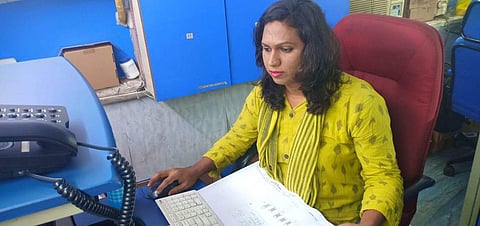

Santosh (Sridevi) Londhe made history as she became the first-ever recognised transgender student to complete her graduation from Mumbai University this year. Understandably, we wanted to speak to her to get too know all about how difficult her journey has been.
I managed to get her number from a friend and we spoke for quite some time. Halfway through our intense conversation, the 35-year-old Mumbai resident, now a proud graduate, told me, "Ma'am it's my birthday today and I want to spend it with the underprivileged children in my area, so could we do the interview quickly?" For a brief second, I didn't know what to say but I replied, "Happy birthday to you, and, yes, of course, we will get done with this real quick, also, please don't call me ma'am as I am way younger," to which, she laughed.
There might have been several other transgender students at MU, but Sridevi (she likes to go by her adopted feminine name) was the first one to be officially recognised. After the landmark verdict of the Supreme Court in April 2014 stating that transgenders are recognised as the third gender, Sridevi enrolled at the University of Mumbai’s (MU) Institute of Distance and Open Learning (IDOL) for BA (Psychology) in 2015.
While applying for the course at IDOL that year, Sridevi chose to identify as a transgender, instead of opting for more convenient male or female options. "I went ahead and chose the transgender option as I didn't want to hide it. I decided to apply with my own identity as I feel that education is everyone's right, it was not like we are committing a crime by trying to earn a respectable livelihood for ourselves. Dr Babasaheb Ambedkar has given the right to education to everyone – male, female or transgender and that's what I firmly believe in," says Sridevi. And well, she has now successfully completed her course and is a proud degree-holder – a rarity in her own community.
MU had introduced a separate ‘transgender’ column, in addition to the conventional 'male' and 'female' columns in 2015-16 – the year Sridevi registered at IDOL.
Rising above the abuse
Sridevi always wanted to become a doctor but was not able to do so because of her family's economic constraints. However, now she has successfully completed her graduation and has recently begun an MA in Psychology through the Indira Gandhi National Open University (IGNOU), the largest distance learning institute in the country.
At a very tender age, she figured that she is a female 'trapped' in a male body and adopted feminine ways. Her parents and relatives told her that it was 'abnormal' behaviour and they took her to a priest in the city with the hopes of 'curing' her. She kept visiting the priest and a temple where she was brought up in the devadasi tradition as a part of the transgender minority community near the border areas of Maharashtra and Karnataka. "I had always felt that the system was not the right place for me. From the time I was young, I have always given preference to my education — abuse, taunts, no family support — all of this could never demoralise me. After completing my school education, I enrolled myself in a junior college in the city, with an aim to pursue medicine. Bruised by the traumatic experience in school, I maintained a low profile but that didn't stop people from discriminating against me. I went into depression after this but I decided to stand back up and fight it," she says.
An artistic streak
Sridevi says that her friends had told her she was kind of artistic and that's when she pursued and completed a three-year interior designing course at a college in the western suburbs. She also enrolled herself for a Diploma in Medical Laboratory Technology (DMLT) course but was not able to complete it due to financial issues. Sridevi has also attended beautician courses and dance classes after which she has also done odd jobs as a make-up artist and dancing at social gatherings. "When I was in my second year, I used to run a small cosmetics shop with the help of my family but that did not work as the profits were low," she adds.
Moving out and what a struggle it would be
Sridevi had been staying with her family until two years ago when she decided to move out. "Our house was extremely cramped and no space was left for the entire family, that's when I decided to move out. It took me around six months to find a place for myself. It was very difficult to find a home. The landlords I approached for renting a place would always say 'no' as soon as I revealed my gender identity," she says.
Later, a woman landlord lent her a place, a small room near the slum areas in the city. Sridevi was also offered a teaching job at a convent in the city. While she says she enjoyed teaching, it was difficult to make ends meet due to her low salary. A few months later, she ran into a city-based businessman and philanthropist who hired her as a designer for his firm Emmanuel Electronics and also to teach at his non-profit Emmanuel Foundation which provides remedial coaching to underprivileged children. "I would like to start my own art coaching centre, but getting a space to do that is a problem," she adds hopefully.
Sridevi is currently working as a circuit designer at an electronics firm in Malad and she also teaches underprivileged kids after her 9-5 job. She hopes that her struggles and her journey will inspire people to change their perception of transgenders.
